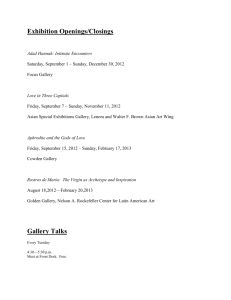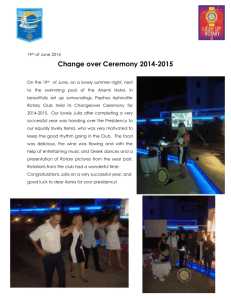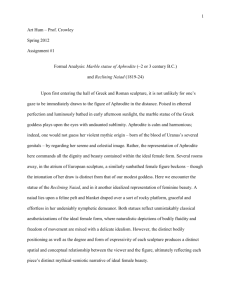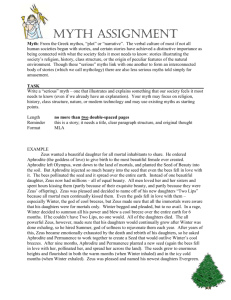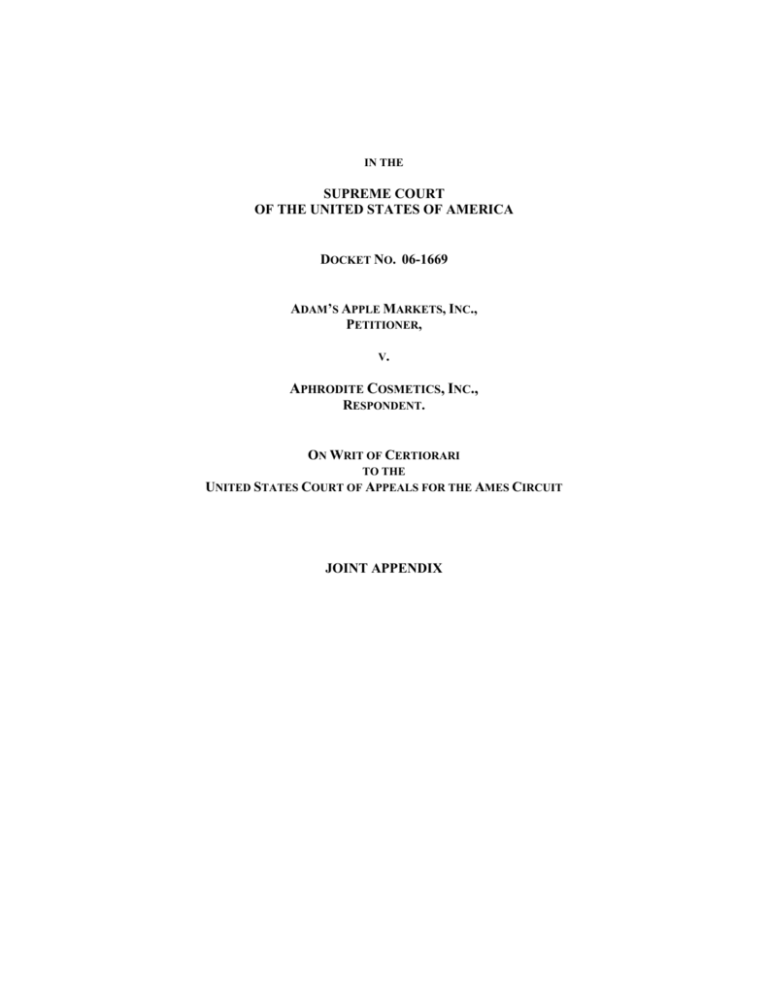
IN THE
SUPREME COURT
OF THE UNITED STATES OF AMERICA
DOCKET NO. 06-1669
ADAM’S APPLE MARKETS, INC.,
PETITIONER,
V.
APHRODITE COSMETICS, INC.,
RESPONDENT.
ON WRIT OF CERTIORARI
TO THE
UNITED STATES COURT OF APPEALS FOR THE AMES CIRCUIT
JOINT APPENDIX
TABLE OF CONTENTS
Off-Limits Materials……………………………………………………………………………….ii
Complaint..…………………………………………………………………………………………1
Exhibit A ............................................................................................................................. 9
Exhibit B………………………………………………………………………………… 11
Exhibit C ............................................................................................... …………………12
Exhibit D…………………………………………………………………………………13
Exhibit E…………………………………………………………………………………14
Defendant’s Motion for Dismissal……………….........................................................................15
Decision and Order on Defendant’s Motion for Dismissal…………………..……….……….…16
Notice of Appeal……………………………………………………………………………….…23
Notice of Cross-Appeal………………………………………………………………..…………24
Decision on Appeal……………………………………………………………………………….25
Order Granting Petition for Writ of Certiorari…………………………………………..………..27
i
OFF-LIMITS MATERIALS
The following materials are off-limits during the Fall 2006 Ames Moot Court Final
Round Competition, and no team member may cite or consult them:
Any and all court filings, briefs, transcripts of proceedings, audio recordings of
proceedings, attorney work product, or court records (except reported judicial decisions)
from any case addressing the issues raised in this case.
Any and all law review articles, bar journal articles, or similar publications that analyze
the issues raised in this case and which are not yet publicly available through publication
either in print, on Lexis or Westlaw, or on the Internet. In the event that a team or one of
its members has already had access to such a publication, disclosure of the title and
author of the publication and the circumstances in which it was accessed must be made to
the Ames Moot Court Competition Case Writers, Julie Barton, HLS ‘92
(jbarton@law.harvard.edu) and Meryl Kessler, HLS ‘93 (mkessler@law.harvard.edu),
and to the opposing team. In such circumstances, arrangements will be made to afford
the opposing team access to the publication in question, and both teams will be required
to treat the publication in question as confidential unless the author or copyright owner of
the publication agrees otherwise. Publications by practitioners and students are included
in this prohibition; however, no team member is required to disclose his or her own
related scholarship.
Any studies or surveys beyond those explicitly included in the Record. Nor may any
team member use any material external to the record to undermine, support, or elaborate
on any studies or surveys referred to in the Record.
Promptly direct any questions about this policy for Off-Limits Materials to Julie Barton or Meryl
Kessler.
ii
UNITED STATES DISTRICT COURT
DISTRICT OF AMES
ADAM’S APPLE MARKETS INC.,
Plaintiff,
v.
APHRODITE COSMETICS, INC.,
Defendant.
)
)
)
)
)
)
)
)
)
)
)
Civ. No. 06-321
COMPLAINT
Plaintiff Adam’s Apple Markets, Inc. (“Adam’s Apple”) brings this action against
Defendant Aphrodite Cosmetics, Inc. (“Aphrodite”) for violation of the Lanham Act §43(a), 15
U.S.C. §1125(a) and the Ames False Advertising Statute, 16 A.G.L. §152.
JURISDICTION AND VENUE
1. Adam’s Apple brings this action pursuant to 15 U.S.C. §1051 et seq. to recover from
competitive injuries suffered as a result of the false or misleading commercial speech of
Aphrodite.
2. This Court has jurisdiction pursuant to 28 U.S.C. §1331.
3. Venue is appropriate in this Court under 28 U.S.C. §1391(b) because a substantial
part of the events giving rise to Adam’s Apple’s claims occurred within this district.
4. This Court has supplemental jurisdiction over Adam’s Apple’s state law claims under
28 U.S.C. §1367(a) because these claims are so related to Adam’s Apple’s Lanham Act claims
that they form part of the same case or controversy in that they arise from the same nucleus of
operative fact and amount to a single judicial proceeding.
1
PARTIES
5. Plaintiff Adam’s Apple is a Delaware corporation having an office and principal
place of business in Ames City, Ames.
6. Defendant Aphrodite is a Delaware corporation having an office and principal place
of business in Ames City, Ames.
FACTUAL ALLEGATIONS
7. Adam’s Apple, founded in 1992, is an organic and natural foods supermarket chain,
with 21 locations in the state of Ames and 183 locations nationwide. Adam’s Apple sells only
food products that are certified as organic or all-natural.
8. Additionally, Adam’s Apple sells some non-food items, including cosmetics and
skincare products. It is the explicit policy of Adam’s Apple to sell only cosmetics and skincare
products that are developed and manufactured without the use of animal testing.
9. Adam’s Apple is the exclusive distributor of Soleil Skincare Products (“Soleil”), a
brand of “cruelty-free” cosmetics and skincare products. Soleil has never used animals in the
development or testing of any of its products. Moreover, Soleil has never contracted with a thirdparty to test its products on animals. Finally, none of the suppliers of the ingredients used in
Soleil’s products perform testing on animals. Each and every Soleil product is labeled “Not
Tested on Animals” and “Cruelty Free.”
10. The sale of Soleil products accounts for approximately 10 percent of Adam’s Apple’s
gross sales, which in Fiscal Year 2005 totaled $3.8 billion.
11. Aphrodite, founded in 1965, is one of the largest cosmetics and skincare companies
in the United States. Aphrodite currently produces over 20 different lines of products, including
cosmetics (lipsticks, blushers, powders, eye shadows, foundations, etc.) skin cleansers, skin
toners, exfoliators, bronzers and a variety of other skincare products.
12. In Fiscal Year 2005, Aphrodite’s total revenue was over $6 billion.
2
13. Most of Aphrodite’s sales are made through retailers (department stores and
boutiques), but it had $40 million in Internet sales in Fiscal Year 2005.
14. Since the late 1970s, Aphrodite has been an aggressive marketer of its products to the
public. Since 1980, Aphrodite has expended, on average, between one-quarter and one-third of
its annual budget to promote, advertise and market its cosmetics and skincare products.
15. According to marketing specialists, by the mid-1990's, three times as many models
and actresses were parties to working agreements with Aphrodite as with any other company.
(See Kate Donaldson, Be Beautiful, The Aphrodite Spirit in the Corporate World, Jefferson Media
Corp., Holbrook, MI., 1998, p. 25 [hereinafter, "Be Beautiful"].)
16. In 1995, Aphrodite paid Julia Roberts and Madonna $20 million each to become
Aphrodite spokeswomen.
17. Aphrodite’s advertising and promotional campaign has been hugely successful. One
Time Magazine story about the baby-boom generation quoted a social historian saying that the
ethos of the largest American generation could be summed up in two words: "Be Beautiful." Brad
Scott, an Advertising Director for Aphrodite, said, with respect to the Aphrodite slogan, "Be
Beautiful," "This thing has become much more than an ad slogan. It’s an idea. It’s like a frame of
mind." (See Donaldson, Be Beautiful, pp. 145-46.)
18. In the late-1990s, Aphrodite’s carefully cultivated image came under attack. Various
media sources and corporate watchdogs provided documentary evidence that:
• Every year, Aphrodite developed and tested its products on thousands of animals—
including primates, dogs, cats, rabbits, guinea pigs, rats, and mice—in its Ames corporate
laboratory. (See, e.g., Exhibit A: “All Things Considered,” National Public Radio report,
Transcript, November 12, 1999.)
• These animals were kept in small, dark, poorly ventilated, and overcrowded cages in the
Aphrodite laboratory. (See Exhibit A.)
19. As a result of this public exposure of Aphrodite’s animal testing policies and
practices, Aphrodite’s sales declined 14 percent between 1999 and 2000. During the same period
of time, Adam’s Apples sales of Soleil products increased 22 percent.
3
20. Aphrodite failed to disclose its animal testing policies and practices to consumers
either in the promotion of its products or at the point of purchase, or in any other manner.
Furthermore, as more fully described below, in response to the public exposure of Aphrodite’s
animal testing policies and practices, Aphrodite has misrepresented to the consuming public its
policies and practices regarding animal testing.
21. In September 2002, Aphrodite ceased conducting animal testing in its own laboratory
and established its own Code of Conduct, which stated that Aphrodite would not test its products
on animals. (See Exhibit B.) Aphrodite displays its Code of Conduct on its website,
www.aphroditecosmetics.com, and in its corporate literature, such as its Annual Report.
22. Aphrodite’s decision to stop conducting its own tests on animals and adoption of the
Code of Conduct were intended, among other things, to entice consumers who do not want to
purchase products tested on animals to buy Aphrodite products. For example, in a press release,
dated September 16, 2002, entitled "Aphrodite Responds to Animal Testing Allegations,"
Aphrodite represented that "animals deserve respect and dignity. Consumers have recognized
that it is inhumane to sacrifice them on the altar of human beauty, and members of the cosmetics
industry have a moral obligation to adjust their policies accordingly. For this reason we have
adopted a Code of Conduct that pledges that we will not test our products on animals.” (See
Exhibit C.)
23. In a letter to the editor published in the Amesville Chronicle on December 14, 2002,
Aphrodite’s Director of Communication, Leslie Wein, wrote:
Consumers…want to support socially conscious companies with good products
and practices.…That is why we want consumers to know that Aphrodite has
established the cosmetics industry’s first code of conduct regarding animal
testing. (See Exhibit D.)
24. In a February 2003 document entitled "The Aphrodite Code of Conduct: What it is,
How it Works," Aphrodite represented that the "key provision of the Code is the pledge
4
that…Aphrodite will not test its products on animals. This pledge represents our commitment to
set the standard in the cosmetics industry."
25. In an Aphrodite document that was distributed to the media entitled "Aphrodite
Production Primer," dated March 2003, Aphrodite represented that ". . . Aphrodite does not test
its products on animals because of its deep conviction that such testing is morally wrong."
26. At the Aphrodite Annual Shareholder Meeting on September 22, 2005, Aphrodite
CEO Penelope H. Duke represented that “Aphrodite is the industry leader on the issue of animal
testing.… Animals should never be the victims of human beauty.” The identical representation
was made by Ms. Duke in a letter dated October 1, 2005 to the New York Times.
27. Notwithstanding Aphrodite’s adoption of its Code of Conduct and its abovementioned representations, Aphrodite has continued to purchase ingredients from suppliers who,
in fact, do perform testing on animals.
28. Reports that Aphrodite continues to purchase ingredients that have been tested on
animals have recently appeared in the media. CBS News, Financial Times, The New York Times,
and The Amesville Chronicle, have all run stories and articles that expose that Aphrodite uses
ingredients that have been tested on animals. For example, a CBS “48 Hours” News report on
October 17, 2004 revealed that:
• Over 500 animals are housed in cages in the laboratory operated by Cosmeti-co, Inc.,
one of Aphrodite’s primary ingredients suppliers.
• Between January and June 2004, 12 primates died in the Cosmeti-co testing facility.
•Approximately 30 percent of the animals in the Cosmeti-co testing facility die within
three weeks of their arrival.
•Aphrodite purchased over $20 million worth of cosmetics ingredients from Cosmeti-co
in 2004.
29. In an environmental audit of the laboratory operated by ICD, Inc., another Aphrodite
supplier, Ernst & Young found the following:
• The problem of overcrowding of laboratory animals needs more attention.
• Small cages, lack of ventilation, and poor lighting have contributed to deaths of
mammals used for testing.
5
• More than half of the laboratory animals live in unsanitary conditions. (See Exhibit E:
ICD document entitled, "Ernst & Young Environmental Audit of ICD Laboratory,"
January 13, 2005; this document was released by the Cosmetics Resource Action Center.)
30. In sum, because Aphrodite continues to purchase ingredients that have been tested
on animals, its representations that it opposes animal testing are false or misleading.
31. As a result of said false or misleading representations, consumers who oppose animal
testing have been misled into buying Aphrodite products. Since Aphrodite announced its Code of
Conduct in 2002, sales of its products have risen 12 percent. During the same time, Adam’s
Apple’s sales of Soleil products have decreased 20 percent.
32. As a further result of said false or misleading representations, Adam’s Apple’s wellestablished goodwill as a purveyor of only cruelty-free cosmetics and skincare products has been
diverted to Aphrodite.
FIRST CLAIM FOR RELIEF (LANHAM ACT §43(a), 15 U.S.C. §1125(a))
33. Adam’s Apple realleges and incorporates by reference paragraphs 1 through 32 as if
set forth herein in full.
34. In order to maintain and/or increase its sales and profits, Aphrodite, through its
advertising, promotional campaigns, public statements and marketing, has made false or
misleading descriptions or representations of fact, including but not limited to the following:
(a) claims that Aphrodite is morally opposed to animal testing, despite the fact that it
continues to purchase ingredients from suppliers who do perform tests on animals;
(b) claims that Aphrodite will not engage in abusive or inhumane treatment of animals,
despite the fact that it continues to purchases ingredients from suppliers who engage in
abusive or inhumane treatment of animals; and,
(c) claims that Aphrodite is an industry leader on the issue of animal testing.
35. Aphrodite’s claims regarding animal testing were made in furtherance of its business
interest in selling their products, which compete in the same markets as Soleil’s and caused
Adam’s Apple, as the exclusive distributor of Soleil products, to suffer a competitive business
6
injury through lost sales, potential sales and goodwill.
36. Aphrodite’s actions, as set forth in this complaint, constitute false or misleading
descriptions or representations of fact in violation of Section 43(a) of the Lanham Act, 15 U.S.C.
§1125(a).
37. As a direct and proximate result of Aphrodite’s conduct as set forth in this count,
Adam’s Apple has suffered irreparable and ongoing injury, in an amount to be proven at trial.
Adam’s Apple has lost sales, and Aphrodite has enriched itself unjustly at Adam’s Apple’s
expense.
SECOND CLAIM FOR RELIEF
(AMES FALSE ADVERTISING STATUTE, 16 A.G.L. §152)
38. Adam’s Apple realleges and incorporates by reference paragraphs 1 through 37 as if
set forth herein in full.
39. Aphrodite’s above described activities constitute deceptive trade practices and false
advertising under §152 of the Ames False Advertising Statute.
REQUEST FOR RELIEF
WHEREFORE, Adam’s Apple respectfully asks this Court to grant judgment in favor of
Adam’s Apple and against Aphrodite as follows:
a. Granting injunctive relief sufficient to terminate all of Aphrodite’s actionable
conduct;
b. Awarding Adam’s Apple damages in an amount to be determined by this Court
to compensate for the financial losses suffered by Adam’s Apple as a result of
Defendants’ false or misleading conduct;
c. Ordering the trebling of these compensatory damages, pursuant to 15 U.S.C.
§1117;
d. Awarding Adam’s Apple reasonable attorneys’ fees and costs in accordance with
15 U.S.C. §1117; and,
7
e. Granting such other relief as the Court may deem just and proper.
ADAM’S APPLE MARKETS, INC.,
By: Harold Chu
Harold Chu, Esq.
Attorney for the Plaintiff
Dated: January 31, 2006
8
EXHIBIT A
NPR Transcript
All Things Considered, National Public Radio
November 12, 1999
Profile: Betty Bursey of the animal-rights group Labwatch, which
has been protesting outside of the corporate headquarters of
Aphrodite Cosmetics, Inc.
Edition: 9:00-10:00 PM
Estimated printed pages: 3
Article Text:
MELANIE BLICK, host:
What price beauty? This is the question that many consumers of
cosmetics should be asking themselves as increasing attention is
focused on the use of animal testing by the cosmetics industry.
Labwatch, an animal-rights advocacy group, recently staged a protest
outside the corporate headquarters of Aphrodite Cosmetics, one of
the nation’s largest cosmetics companies, to protest Aphrodite’s
testing of its products on animals. NPR's Aaron Hui reports.
AARON HUI reporting:
The multi-billion dollar cosmetics industry is in the middle of
controversy these days regarding the use of animals for the testing of
cosmetics and skincare products. Cosmetics companies argue that
consumer safety requires that products be tested before usage to
determine the level of allergic reaction and irritation. Animal-rights
activists argue that animal testing is both inhumane and unnecessary
and have targeted some of the largest offenders with protests,
petitions, and letter-writing campaigns. Betty Bursey, an organizer
with the animal-rights group Labwatch, led a 500-person protest
outside the corporate headquarters of Aphrodite Cosmetics last week.
Ms. BETTY BURSEY (Labwatch): Labwatch exists to monitor the
testing of animals by industry. Our goal is to use public opinion to
put pressure on companies to stop the use of animal testing, which is
an inhumane and immoral practice. We’ve targeted the cosmetics
industry—and Aphrodite in particular—because of their extensive
and largely unregulated use of animals for testing in the production
process.
HUI: Bursey says that cosmetics companies like Aphrodite use a
9
variety of different tests on animals, such as the Draize eye test, in
which shampoos, mascaras, and soaps are applied to the eyes of
conscious rabbits to test for irritancy.
Ms. BURSEY: The tests these companies use, such as the Draize
test, are not only cruel to animals, but also largely irrelevant, since
there are major differences between a rabbit’s eye and a human’s. In
another test, the LD50, rabbits, dogs, cats, and guinea pigs are used
to test lipsticks, skincare products, shampoos, and moisturizers. The
test is conducted by introducing the product under investigation into
the animal either intravenously or by the mouth. The animal is fed
up to 50 percent of its body weight and the aim is to find the dose
that will kill half the animal sample.
HUI: Bursey says Aphrodite is one of the most egregious users of
animal testing in the cosmetics industry, with thousands of animals—
primates, dogs, cats, rabbits, guinea pigs, rats, and mice—in its Ames
laboratory.
Ms. BURSEY: The problem with companies like Aphrodite, which
keep thousands of animals in their lab, is not only that they
administer painful and deadly tests on their lab animals, but also that
the animals are housed in inhumane conditions. In the Aphrodite lab,
the animals are kept in small, dark, poorly ventilated, and
overcrowded conditions….
…..
Copyright ©1999 National Public RadioÆ. All rights reserved. No
quotes from the materials contained herein may be used in any media
without attribution to National Public Radio. This transcript may not
be reproduced in whole or in part without prior written permission.
For further information, please contact NPR's Permissions
Coordinator at (202) 531-4000. Record Number: 200307252104
10
EXHIBIT B
APHRODITE CODE OF CONDUCT
Aphrodite Cosmetics, Inc. was founded on a promise
Implicit in that act was the determination that we would build a relationship with our customers based on trust,
honesty, and shared values.
Aphrodite creates, manufactures and markets beauty products. At every step in that process, we are driven to
do not only what produces the best product for our customers, but also what is ethical and humane. Our
customers care about these values, and so do we.
At the core of the Aphrodite corporate ethic is the belief that all forms of life deserve respect. Aphrodite does
not believe that animals should be sacrificed for the sake of beauty. Although our products are produced for
humans, humans are not our only concern.
THE FACTS
It is estimated that over 35,000 animals are used in cosmetic tests every year throughout the European Union
alone.
In other countries such as the United States and Japan, where testing is extensive, such information is not
publicly available.
This is despite extensive public opposition and the development of 'non-animal' alternative tests.
The most common tests involve dripping a material into rabbits' eyes or applying it to the shaved backs of
rabbits or guinea pigs and studying the resulting irritation or damage.
Animals are also force-fed or dosed with substances to assess affects. The tests can cause great suffering and
in some cases death.
OUR PLEDGE
Because Aphrodite believes cosmetics testing on animals is unethical and unnecessary, Aphrodite pledges
that we will no longer test our products on animals. We recognize that this change is not only right for
business, but just plain right.
What will stay the same at Aphrodite is what we believe in – Profits With Principles. We at Aphrodite will
continue to challenge ourselves, our industry, and our customers.
We promise: We will promote animal protection throughout our business activities. We are against animal
testing in the cosmetics and toiletries industry. We will not test our products on animals.
September 2002
11
EXHIBIT C
FOR IMMEDIATE RELEASE
Contact:
Joseph A. Stotz
Aphrodite Cosmetics, Inc.
2809 Magnolia Drive
Ames City, Ames 00101
Phone: 111-242-4990
http://www.aphroditecosmetics.com
info@aphroditecosmetics.com
Aphrodite Responds to Animal Testing Allegations
Ames City, Ames – September 16, 2002 – Aphrodite Cosmetics, Inc. announced today
that it has adopted a Code of Conduct regarding animal testing and will immediately
cease testing its products on animals. This announcement establishes Aphrodite as an
industry leader on the important issue of animal testing.
According to the Code of Conduct, thousands of animals are tested yearly despite public
opposition and the availability of “non-animal” alternative tests. Because it believes that
animal testing is both unethical and unnecessary, Aphrodite has committed to discontinue
its own testing and advocate for animal protection within the cosmetics business.
“Cosmetics manufacturers must recognize animals deserve respect and dignity,” said
Aphrodite CEO Penelope H. Duke. “Consumers have recognized that it is inhumane to
sacrifice them on the altar of human beauty, and members of the cosmetics industry have
a moral obligation to adjust their policies accordingly. For this reason we have adopted a
Code of Conduct that pledges that we will not test our products on animals.”
Aphrodite’s new policy ensures that Aphrodite will continue to combine the best business
practices with the highest moral principles. It is Aphrodite’s hope that this new policy
will also raise awareness regarding animal welfare throughout the cosmetics industry.
The Code of Conduct will therefore be available to or communicated to any interested
parties, including visitors to our sites, shareholders and customers.
12
EXHIBIT D
Letter to the Editor from Aphrodite’s Director of Communications, Leslie Wein, published in the
Amesville Chronicle on December 14, 2002:
To the Editor:
Every year, 35,000 animals are used to test cosmetics in Europe. Here, in the
United States, thousands of animals are also used in testing, but the exact
numbers are not known because cosmetics companies do not make this
information known to the public.
This use of animal testing by cosmetics companies is both inhumane and
unnecessary. It is inhumane because animals—including primates, dogs, cats,
rabbits, and other mammals—are forced to endure painful and often lethal tests,
including the application of cosmetics and toiletries directly to their eyes and the
force-feeding of substances to determine toxicity. It is unnecessary, because
other methods exist to assess the safety of cosmetics.
Aphrodite Cosmetics—one of the nation’s largest cosmetics companies—cannot
sit by while these abuses continue to take place. Recognizing that it is a leader in
the cosmetics industry, Aphrodite feels compelled to speak out on this important
matter of public concern. Earlier this year, Aphrodite adopted a Code of Conduct
in which we pledged to cease all testing of our cosmetics on animals—a pledge
we have kept.
By taking this stand, Aphrodite hopes that it can set an example for other
members of the cosmetics industry. We hope that other cosmetics companies
will recognize, as we have, that renouncing animal testing is not just the right
thing to do—it is also right for business. Consumers of cosmetics want to
support socially conscious companies with good products and practices. We
believe that companies must respond when consumers call for ethical action.
That is why we want consumers to know that Aphrodite has established the
cosmetics industry’s first code of conduct regarding animal testing.
Leslie Wein
Director of Communications
Aphrodite Cosmetics, Inc.
13
EXHIBIT E
Environmental Audit of ICD Laboratory (Extract)
I. Laboratory compliance and waste tracking system
Generally, both the laboratory and waste tracking system comply with ICD's requirements
and state and federal regulations. However, improvements can be made with respect to the
following points:
Ventilation
In mixing chemical warehouse, ventilation system (cyclones) does not work efficiently and
requires repair to reduce dust of potentially harmful chemical powders that can affect
workers' health.
Chemical storage
In general, the storage houses are located in isolated position away from the laboratory. They
are well ventilated. All materials are stored in labeled drums. However, within the laboratory,
harmful chemicals are stored near the working place.
Protective equipment (PE)
In some instances, workers do not wear protective equipment (gloves, masks) for reasons
cited by the workers as follows:
1. Protective equipment is inconvenient in performance of their work.
2. Absence of strict implementation of PE's usage.
Black smoke
Firing non-reusable garbage in combustors caused exhaustion of black smoke into the air.
The company should consider that matter and accelerate measures to reduce black smoke.
Laboratory Animals
Laboratory animals are overcrowded. During course of audit, small cages, lack of
ventilation, and poor lighting contributed to deaths of mammals and especially primates.
More than half the laboratory animals live in unsanitary conditions.
Harmful use of chemicals
Measures should be taken.
14
UNITED STATES DISTRICT COURT
DISTRICT OF AMES
ADAM’S APPLE MARKETS INC.,
Plaintiff,
v.
APHRODITE COSMETICS, INC.,
Defendant.
)
)
)
)
)
)
)
)
)
)
)
Civ. No. 06-321
DEFENDANT’S MOTION FOR DISMISSAL
Pursuant to Fed. R. Civ. P. 12(b)(6), Defendant Aphrodite Cosmetics, Inc. moves for
dismissal of Count I in the above-captioned action. The grounds for this motion are that Plaintiff
has failed to state a claim as a matter of law under the Lanham Act §43(a), 15 U.S.C. §1125(a)
because:
1. Congress did not intend parties in Plaintiff’s position to have standing to sue under
§43(a) and Plaintiff therefore lacks prudential standing; and,
2. Defendant’s alleged speech does not give rise to a claim under §43(a) of the Lanham
Act because it is not “commercial” speech.
Dated: February 14, 2006
By:
Karen Kuhlman
Karen Kuhlman, Esq.
Attorney for the Defendant
15
UNITED STATES DISTRICT COURT
DISTRICT OF AMES
ADAM’S APPLE MARKETS INC.,
Plaintiff,
v.
APHRODITE COSMETICS, INC.
Defendant.
)
)
)
)
)
)
)
)
)
)
)
Civ. No. 06-321
DECISION AND ORDER ON DEFENDANT’S MOTION FOR DISMISSAL
Pursuant to Fed. R. Civ. P. 12(b)(6), Defendant Aphrodite Cosmetics, Inc. (“Aphrodite”)
has moved to dismiss Count I of Plaintiff Adam’s Apple Markets, Inc.’s (“Adam’s Apple”)
Complaint, which alleges that Defendant has violated Section 43(a) of the Lanham Act, 15 U.S.C.
§ 1125(a). For the reasons discussed below, we find the Plaintiff has prudential standing to sue
under the Lanham Act, but conclude that the Defendant’s speech was noncommercial speech not
subject to a Lanham Act claim. The court therefore grants Defendant’s motion to dismiss
Plaintiff’s Lanham Act claim with prejudice. The court also dismisses without prejudice
Plaintiff’s claim under 16 A.G.L. §152 for lack of subject matter jurisdiction.
12(b)(6) Standard
Rule 12(b)(6) permits dismissal of a lawsuit for failure to state a claim upon which relief
could be granted. See Fed. R. Civ. P. 12(b)(6). The Rule “requires the Court to construe the
complaint in the light most favorable to the plaintiff, accept all the complaint’s factual allegations
as true, and determine whether the plaintiff undoubtedly can prove no set of facts in support of
the claims that would entitle relief.” Grindstaff v. Green, 133 F.3d 416, 421 (6th Cir. 1998). “The
Federal Rules of Civil Procedure do not require a claimant to set out in detail the facts upon
which he bases his claim.” Conley v. Gibson, 355 U.S. 41, 47 (1957). However, “[t]o avoid
dismissal under Rule 12(b)(6), a complaint must contain either direct or inferential allegations
16
with respect to all the material elements of the claim.” Wittsock v. Mark A. Van Sile, Inc., 330
F.3d 899, 902 (6th Cir. 2003).
Conclusions of Law
In Count I of the complaint, the Plaintiff alleges that the Defendant violated Section
43(a)(1)(B) of the Lanham Act, which provides that:
“(1) Any person who, on or in connection with any goods or services, or any container for goods,
uses in commerce any word, term, name, symbol, or device, or any combination thereof, or any
false designation of origin, false or misleading description of fact, or false or misleading
representation of fact, which…
(B) in commercial advertising or promotion, misrepresents the nature, characteristics, qualities, or
geographic origin of his or her or another person's goods, services, or commercial activities, shall
be liable in a civil action by any person who believes that he or she is or is likely to be damaged
by such act.” 15 U.S.C. §1125(a).
Plaintiff alleges that certain statements made by the Defendant were false or misleading so as to
misrepresent its policies and practices regarding the testing of its cosmetic and skincare products
on animals. Plaintiff further alleges that as a result of Defendant’s statements it has suffered a
competitive business injury through lost sales, potential sales and goodwill.
The Defendant in this case raises two challenges to Plaintiff’s Lanham Act claim in its
motion to dismiss. First, the Defendant argues that the Plaintiff lacks prudential standing to sue
under Section 43(a) of the Lanham Act because it is not the type of plaintiff intended by Congress
to pursue an unfair competition claim under 43(a). The Defendant further contends that even if
the Court finds that the Plaintiff has standing to sue under the Lanham Act, Defendant’s speech
was noncommercial and therefore not subject to the Lanham Act. Based on the lack of standing
or, in the alternative, the noncommercial nature of its speech, the Defendant contends that the
complaint must be dismissed. The Court considers each of the Defendant’s two grounds for
dismissal separately below:
I. Standing
The initial issue before the court today—one that is a question of first impression in the
Ames Circuit—is whether a Lanham Act plaintiff alleging competitive injury due to the false or
17
misleading statements of the defendant has the requisite prudential standing to bring a suit under
Section 43(a) of the Lanham Act. 15 U.S.C. 1125(a). As a preliminary matter, it is the opinion of
the court that the Plaintiff has Article III, or constitutional standing. In order to bring an action in
federal court, a plaintiff must show (1) injury in fact (2) that is fairly traceable to the actions of
the defendant and (3) that likely will be redressed by a favorable decision. Lujan v. Defenders of
Wildlife, 504 U.S. 555, 560-61 (1992). Plaintiff alleges that as the exclusive distributor of Soleil
skincare products, it has lost sales, potential sales and goodwill due to the Defendant’s false and
misleading statements about its treatment of animals in the development and testing of its
products. Plaintiff further alleges that it will continue to lose sales and Defendant will continue to
be unjustly enriched at Plaintiff’s expense if relief is not forthcoming. Thus, Plaintiff has
satisfied the requirements for Article III standing.
The more challenging question for the court today is whether Adam’s Apple has
prudential standing. Prudential standing is an “integral part of judicial self-government.” Lujan,
504 U.S. at 560. The object of this self-governance by the courts is to ensure the plaintiff “is a
proper party to invoke judicial resolution of the dispute and the exercise of the court’s remedial
powers.” Bender v. Williamsport Area Sch. Dist., 475 U.S. 534, 546 at n. 8 (1986). Federal
courts impose prudential limits to avoid making broad-ranging decisions with social impact that
do not otherwise vindicate any individual rights. The courts also invoke prudential standing
requirements to limit access to the federal courts to plaintiffs best suited to assert a particular
claim. Phillips Petroleum Co. v. Shutts, 472 U.S. 797, 804 (1985).
Our sister courts have developed different approaches to determine whether a plaintiff
has prudential standing under the Lanham Act.1 The Seventh, Ninth and Tenth Circuits have
1
The question of whether Congress abrogated the prudential standing requirements in the Lanham Act has
been addressed by a number of federal courts. See, e.g., Conte Bros. Automotive, Inc. v. Quaker StateSlick 50, Inc., 165 F.3d 221, 229 (3rd Cir. 1998); Procter & Gamble Co., et al. v. Amway Corp., 242 F.3d
539, 562 (5th Cir. 2001). Rather than conduct a separate inquiry into Congress’ intentions, we will join
those courts in concluding that Congress did not intend to abrogate prudential standing limitations in the
Lanham Act. Therefore, we may legitimately consider whether the Plaintiff has prudential standing.
18
adopted a categorical approach which requires a Lanham Act plaintiff to be a competitor of the
defendant who alleges a competitive injury. See Stanfield v. Osborne Industries, Inc., 52 F.3d
867, 873 (10th Cir. 1995); The Jack Russell Terrier Network of Northern California v. American
Kennel Club, 407 F.3d 1027, 1037 (9th Cir. 2005); L.S. Heath & Son, Inc. v. AT&T Information
Systems, Inc., 9 F.3d 561, 575 (7th Cir. 1993). The Fifth and the Third circuits have adopted the
less clear-cut test set forth in Conte Bros., which evaluates the following factors: (1) the nature of
the plaintiff’s alleged injury; (2) the directness or indirectness of the asserted injury; (3) the
proximity or remoteness of the party to the alleged injurious conduct; (4) the speculativeness of
the damages claim; and (5) the risk of duplicative damages or complexity in apportioning
damages. Conte Bros. Automotive, Inc. v. Quaker State-Slick 50, Inc., 165 F.3d 221, 234 (3rd Cir.
1998); Proctor & Gamble Co. v. Amway Corporation, et al., 242 F.3d 539, 563 (5th Cir. 2001).
We will follow the approach laid out in Conte.
Under the Conte test, we first consider the nature of the plaintiff’s alleged injury. The
Lanham Act was enacted to provide protection against anti-competitive conduct in a commercial
context. Plaintiff alleges that the Defendant has used false and misleading statements to entice
customers to buy Aphrodite products who might otherwise not do so causing Adam’s Apple’s
sales of Soleil products to decline. Plaintiff further alleges that its goodwill with customers who
want to buy only natural and cruelty free products has been diverted to Aphrodite as a result of its
claims that it does not conduct animal testing. We conclude that Adam’s Apple’s alleged injury
is the type of injury Congress was seeking to prevent. The second factor—directness of the
alleged injury—further supports standing. As an exclusive distributor of Soleil products, Adam’s
Apple has allegedly lost sales as a result of Aphrodite’s misleading statements. Moreover,
Aphrodite allegedly competes directly with Adam’s Apple when it sells its products to consumers
over the Internet. Because not all other retailers of cosmetics that compete with Aphrodite can
legitimately allege that they have lost goodwill and been injured directly as Adam’s Apple can,
the third factor suggests standing. Although Adam’s Apple has not yet submitted proof of exact
19
damages, it is ready to do so at trial and therefore the damages are not speculative. Finally, the
risk of duplicative damages and apportionment complexity is low because Adam’s Apple’s
alleged damages are measurable and its injury distinguishes it from other potential plaintiffs.
Our analysis leads to the conclusion that Plaintiff has prudential standing to sue under the
Lanham Act.
II.
Commercial or Noncommercial Speech
The second question before the court is whether, as Defendant asserts, its speech is
noncommercial and therefore immune from a claim under the Lanham Act. Aphrodite argues
that its speech about treatment of animals in its laboratories is not “commercial advertising or
promotion” within the meaning of Section 43(a)(1)(B). To be “commercial advertising or
promotion” speech must be: “(1) commercial speech, (2) by a defendant who is a commercial
competitor of the plaintiff, (3) for the purpose of inducing customers to buy defendant’s goods or
services, and (4) disseminated sufficiently to the relevant purchasing public to constitute
“advertising” or “promotion” within the industry.” Coastal Abstract Service, Inc. v. First
American Title Ins. Co., 173 F.3d 725, 735 (9th Cir. 1999). Defendant contends that Plaintiff
cannot establish the threshold element of the test because the speech at issue was not commercial.
The speech, therefore, according to Defendant, is not actionable under Section 43(a). The crucial
factor for the court to decide is whether Defendant’s speech was commercial or noncommercial.
In Bigelow v. Virginia, 421 U.S. 809 (1975) and Va. Pharmacy Bd. v. Va. Consumer
Council, 425 U.S. 748 (1976), the Supreme Court extended First Amendment protection to
commercial speech. Commercial speech differs from speech at the core of the First Amendment,
though, and the Court has articulated a method of distinguishing between commercial and
noncommercial speech. To make this determination, we must consider the following factors in
combination: (1) is the speech an advertisement? (2) does the speech refer to a specific product
20
or service? and (3) did the speaker act out of economic motivation? Bolger v. Youngs Drug
Products Corp., 463 U.S. 60 (1983). 2
The speech at issue here should be understood as part of a dialogue on a matter of public
concern, not advertising or promotional materials intended to direct consumers toward certain
products. Indeed, none of the statements made by Aphrodite makes reference to particular
products or services. Aphrodite’s speech is inseparable from dialogue about an issue that
consumers care about. As one Aphrodite executive explained in a letter to the editor of the
Amesville Chronicle: “Consumers…want to support socially conscious companies with good
products and practices.… That is why we want consumers to know that Aphrodite has established
the cosmetics industry’s first code of conduct regarding animal testing.” Complaint at ¶23. Under
the Bolger test, Aphrodite’s allegedly violative speech is clearly removed from two of the three
elements of commercial speech: Aphrodite’s statements are neither in an advertising format nor
do they refer to any specific products.
The final part of the Bolger test addresses the commercial motivation of the speaker. The
Defendant was undoubtedly economically motivated to defend its corporate image from criticism
about its treatment of laboratory animals. But as the Fifth Circuit has noted “[w]e can well
imagine cases in which a speaker’s primary motivation is economic, but the speech nonetheless is
protected.” Proctor & Gamble Co., supra, 242 F.3d at 553. We do not find this to be a case of
commercial speech linked artificially to noncommercial speech in order to shoehorn the former
into greater First Amendment protection. See Central Hudson Gas & Elec. v. Public Serv.
Comm’n, supra, 447 U.S. at 563, n. 5; Zauderer v. Office of Disciplinary Counsel, 471 U.S. 626,
637 n. 7 (1985). Instead, these statements by Aphrodite are noncommercial speech intended to
2
The Court has announced more than one test for commercial speech. See e.g., Va. Pharmacy Bd. v. Va.
Consumer Council, supra, 425 U.S. at 762 (“speech that does no more than propose a commercial
transaction”); Central Hudson Gas & Elec. V. Public Serv. Comm’n, 447 U.S. 557, 561 (1980)
(“expression related solely to the economic interests of the speaker and its audience”). We rely on the
Bolger test.
21
respond to criticism and participate in a dialogue about the state of animal testing in the cosmetics
industry.
Participation by a corporation in a dialogue on a matter of public concern must be
afforded more protection than an advertisement page in a magazine. In fact “[t]he freedom of
speech and of the press guaranteed by the Constitution embraces at the least the liberty to discuss
publicly and truthfully all matters of public concern without previous restraint or fear of
subsequent punishment…. Freedom of discussion, if it would fulfill its historic function in this
nation, must embrace all issues about which information is needed or appropriate to enable the
members of society to cope with the exigencies of their period.” Thornhill v. Alabama, 310 U.S.
88, 101-102 (1940). In Thornhill, the Court considered First Amendment protection of speech
about labor disputes. Similarly, our contemporary “area of free discussion” should include debate
about animal rights. Id. at 103. The press releases, letters and public communications serve the
public by informing it about Aphrodite’s practice of animal testing. Having read those
statements, a member of the public may choose to boycott Aphrodite’s products as a result and/or
play a larger role in the national debate about animal rights though activism. This is exactly the
type of participation in public debate that the First Amendment was intended to foster.
III. Conclusion
For the foregoing reasons, the court GRANTS Defendant’s Motion to Dismiss Count I of
the Complaint because its speech was noncommercial and therefore not subject to action under
§43(a) of the Lanham Act. The court dismisses Count II of the Complaint without prejudice for
lack of subject matter jurisdiction.
SO ORDERED
Dated: June 6, 2006
Eileen Cole
Eileen Cole
United States District Judge
22
UNITED STATES DISTRICT COURT
DISTRICT OF AMES
ADAM’S APPLE MARKETS INC.,
Plaintiff,
v.
APHRODITE COSMETICS, INC.
Defendant.
)
)
)
)
)
)
)
)
)
)
)
Civ. No. 06-321
NOTICE OF APPEAL
Notice is hereby given that Adam’s Apple Markets, Inc., Plaintiff in the above-captioned
matter, appeals to the United States Court of Appeals for the Ames Circuit from a final judgment
entered in this action on June 6, 2006. The ground for appeal is that, in its Decision and Order on
Defendant’s Motion to Dismiss, the District Court erred by finding that the Defendant’s
statements about its animal testing practices and policies constituted noncommercial speech and
therefore were not subject to a claim pursuant to Lanham Act §43(a), 15 U.S.C. §1125(a).
By: Harold Chu
Dated: June 15, 2006
Harold Chu, Esq.
Attorney for the Plaintiff
23
UNITED STATES DISTRICT COURT
DISTRICT OF AMES
ADAM’S APPLE MARKETS INC.,
Plaintiff,
v.
APHRODITE COSMETICS, INC.
Defendant.
)
)
)
)
)
)
)
)
)
)
)
Civ. No. 06-321
NOTICE OF CROSS-APPEAL
Notice is hereby given that Aphrodite Cosmetics, Inc., Defendant in the above-captioned
matter, hereby cross-appeals to the United States Court of Appeals for the Ames Circuit from a
final judgment entered in this action on June 6, 2006. The ground for appeal is that, in its
Decision and Order on Defendant’s Motion to Dismiss, the District Court erred by finding that
the Plaintiff had prudential standing to bring a claim under Lanham Act §43(a), 15 U.S.C.
§1125(a).
By: Karen Kuhlman
Karen Kuhlman, Esq.
Attorney for the Defendant
Dated: June 20, 2006
24
UNITED STATES COURT OF APPEALS
FOR THE AMES CIRCUIT
ADAM’S APPLE MARKETS INC.,
Appellant/Cross-Appellee,
v.
APHRODITE COSMETICS, INC.,
Appellee/Cross-Appellant.
)
)
)
)
)
)
)
)
)
)
)
Civ. No. 06-705
DECISION ON APPEAL
Appellant appeals from the order of the United States District Court for the District of
Ames granting Appellee’s motion to dismiss. Appellant contends that the District Court erred by
finding that the Appellee’s statements about its animal testing practices and policies constituted
noncommercial speech and therefore were not subject to a claim pursuant to the Lanham Act
§43(a), 15 U.S.C. §1125(a). Appellee cross-appeals, contending that the District Court erred by
finding that the Appellant had prudential standing to bring a claim under the Lanham Act §43(a),
15 U.S.C. §1125(a).
For the reasons set forth in the opinion of the District Court, we affirm the holding that
Appellee’s statements about its animal testing practices and policies constituted noncommercial
speech and therefore were not subject to a Lanham Act claim. We disagree, however, with the
District Court’s finding that the Appellant had prudential standing to sue under the Lanham Act.
In making its decision, the District Court employed an inappropriate test for prudential standing
under the Lanham Act. Adam’s Apple Markets is not a direct competitor to Appellee in any
significant way, and therefore fails to satisfy the correct test for prudential standing articulated by
our sister courts in the Seventh, Ninth and Tenth Circuits. See L.S. Heath & Son, Inc. v. AT&T
Information Systems, Inc., 9 F.3d 561, 575 (7th Cir. 1993); The Jack Russell Terrier Network of
25
Northern California v. American Kennel Club, 407 F.3d 1027, 1037 (9th Cir. 2005); Stanfield v.
Osborne Industries, Inc., 52 F.3d 867, 873 (10th Cir. 1995). We therefore reverse the District
Court and find that Adam’s Apple lacks standing to sue Aphrodite.
DATED: July 17, 2006
Katharine White
Katharine White
Judge
U.S. Court of Appeal for the Ames Circuit
26
IN THE SUPREME COURT
OF THE UNITED STATES OF AMERICA
ADAM’S APPLE MARKETS, INC.,
Petitioner,
v.
APHRODITE COSMETICS, INC.,
Respondent.
)
)
)
)
)
)
)
)
)
)
)
Civ. No. 06-1669
ORDER GRANTING PETITION FOR WRIT OF CERTIORARI
TO ALL PARTIES AND THEIR COUNSEL OF RECORD
PLEASE TAKE NOTICE THAT the Petition for Writ of Certiorari to the Ames Circuit
in the above-captioned matter is hereby granted. Review is limited to the following two
questions: (1) whether Petitioner has prudential standing to bring an unfair competition claim
under the Lanham Act §43(a), 15 U.S.C. §1125(a); (2) whether Respondent’s statements about its
animal testing practices and policies constitute noncommercial speech such that they are not
subject to a claim under the Lanham Act §43(a), 15 U.S.C. §1125(a).
The parties are directed to timely submit their briefs in accordance with the schedule they
have received.
IT IS SO ORDERED.
DATED: September 7, 2006
27


